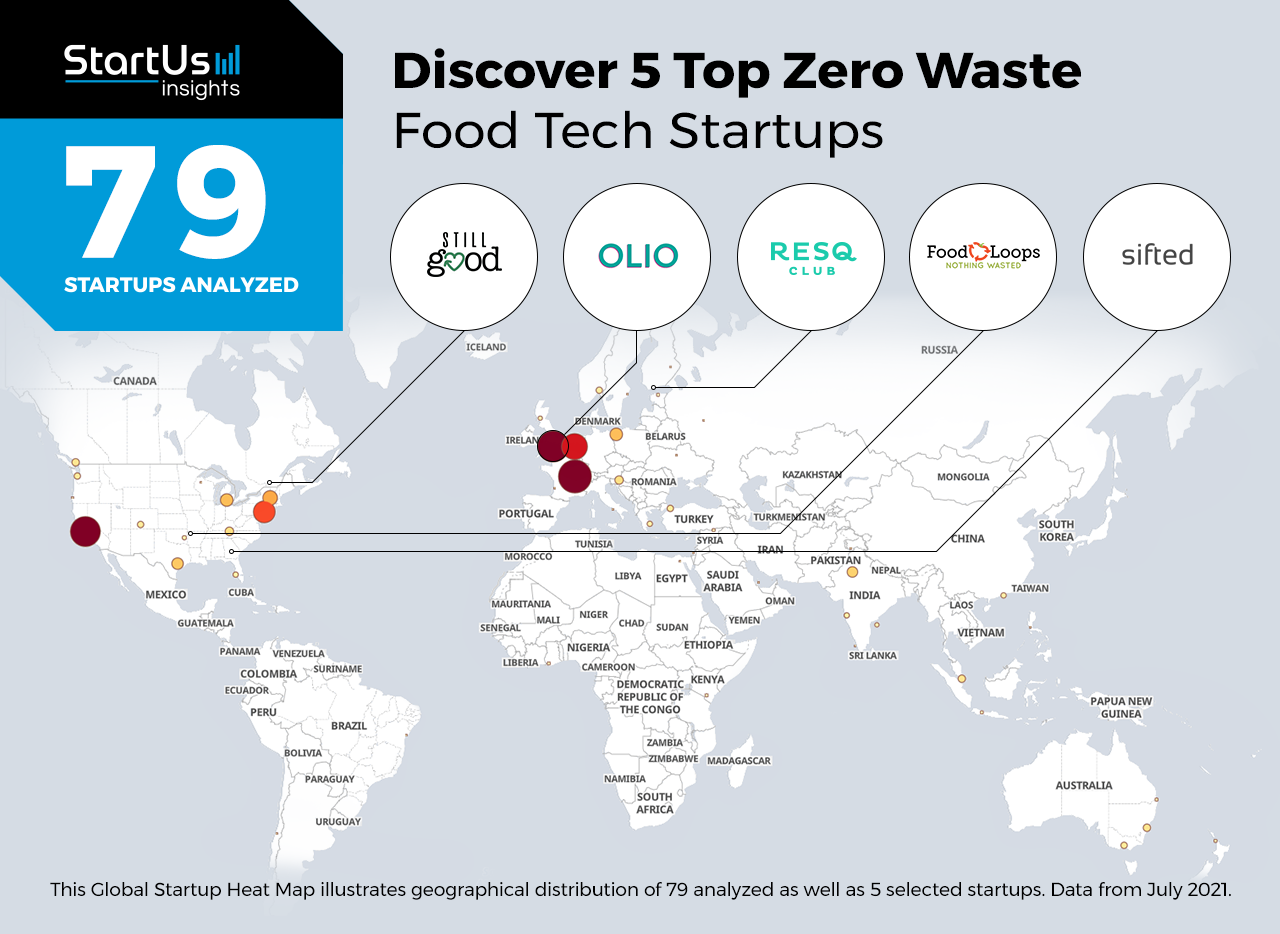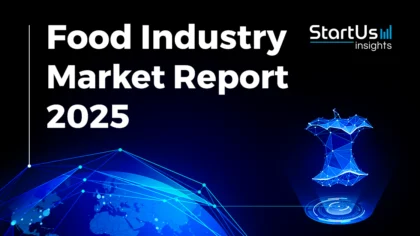Staying ahead of the technology curve means strengthening your competitive advantage. That is why we give you data-driven innovation insights into the food industry. This time, you get to discover 5 hand-picked zero waste food tech startups.
Global Startup Heat Map highlights 5 Top Zero Waste Food Tech Startups out of 79
The insights of this data-driven analysis are derived from the Big Data & Artificial Intelligence-powered StartUs Insights Discovery Platform, covering 2.093.000+ startups & scaleups globally. The platform gives you an exhaustive overview of emerging technologies & relevant startups within a specific field in just a few clicks.
The Global Startup Heat Map below reveals the distribution of the 79 exemplary startups & scaleups we analyzed for this research. Further, it highlights 5 zero waste food tech startups that we hand-picked based on criteria such as founding year, location, funding raised, and more. You get to explore the solutions of these 5 startups & scaleups in this report. For insights on the other 74 zero waste food solutions, get in touch.
Food Loops facilitates Zero Waste Events
Global food systems significantly contribute to excessive waste and food insecurity. Besides this, it is also unsustainable due to the rising greenhouse gas emissions. For instance, social events that avail catering services amass large amounts of edible food waste. To reduce preventable food waste, startups develop solutions to ensure zero waste at events and gatherings. These solutions achieve zero waste through valorization, composting, or recirculating.
US-based startup Food Loops designs custom solutions to enable zero waste events. The startup establishes the right system to collect and recycle all forms of waste, including food. Along with this, the startup provides waste collection appliances and products for efficient operations at events. Once an event is over, the startup utilizes its facilities to complete the processing and composting of all the food waste.
OLIO develops Zero Waste Solutions for Restaurants & Businesses
Businesses and restaurants, in particular, contribute to a sizable portion of global food waste. Due to poor decision-making, such as ordering large portions of food and lack of waste segregation, restaurants continue to generate tons of food waste. Thus, startups develop solutions that assist businesses to achieve zero waste, for example, through redistributing or reusing food.
British startup OLIO enables businesses to generate zero food waste. First, the startup contacts businesses to assess food collection needs. Then, volunteers collect the food and redistribute them to local communities. This way, the startup ensures minimal operational disturbance and also coordinates with charities to ensure that food is not wasted.
ResQ redistributes Surplus Food
Surplus food from grocery stores or restaurants presents an issue of underutilization of resources. This waste food exists as an opportunity for businesses to generate revenue, especially food that consumers refuse at the last minute. For example, startups develop solutions to connect consumers with surplus food through last-mile delivery solutions.
Finnish startup ResQ re-introduces surplus food into the supply chain. ResQ turns the lost revenue from unsold meals into an extra revenue stream by connecting customers who pay money for surplus food with businesses who have excess food via an app.
Sifted donates Edible Food Scraps
Food waste and insecurity is a global challenge that requires coordinated responses from different levels of governments and non-governmental organizations. For example, uninformed consumers who generate food waste have the potential to reduce the extent of food insecurity. To prevent edible food waste, startups develop solutions that collect all edible food scraps and redirect them. For instance, startups facilitate the donation of these scraps to communities and individuals that require it the most.
US-based startup Sifted provides zero waste catering solutions for businesses. Sifted’s kitchens ensure zero food waste through composting or donating leftover food scraps. Sifted donates over 145.000 lunches to those who experience food insecurity in 6 cities, including Austin, Chicago, and Los Angeles. Further, after the COVID-19 pandemic, the startup delivers services for both physical and virtual events including carbon-neutral shipping and packaging.
Still Good recycles Food Waste
Wastage of food products, such as fruits and grains, contributes to avoidable food waste. Often, businesses do not investigate the reusability of these foods and consider them as waste. However, the pulp from fruits and the reusability of spent grains provide scope for zero waste in kitchens. To advance this mission, startups design solutions to reuse such waste food products. These solutions bring them back into the supply chain, thus promoting zero waste.
Canadian startup Still Good recovers juice pulp, spent grains, fruits, and vegetables through partnerships with local businesses. The startup then uses these products to make and sell cookies. These cookies are packed in compostable packages, further emphasizing zero waste generation. The startup also provides a percentage of its proceeds to local, sustainable businesses.
Discover more FoodTech Startups
Food startups such as the examples highlighted in this report focus on 3D printing, artificial proteins as well asrecycling surplus food and food waste. While all of these technologies play a major role in advancing the food industry, they only represent the tip of the iceberg. To explore more food technologies, simply get in touch to let us look into your areas of interest. For a more general overview, you can download our free FoodTech Innovation Report to save your time and improve strategic decision-making.



![Food and Beverage Industry: Top 10 Technology Trends [2025 & Beyond]](https://www.startus-insights.com/wp-content/uploads/2024/11/Food-and-Beverage-Industry-Trends-SharedImg-StartUs-Insights-noresize-420x236.webp)






